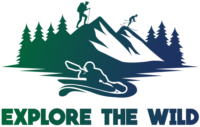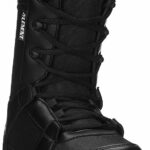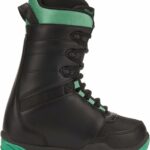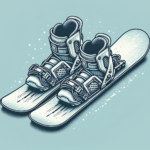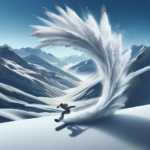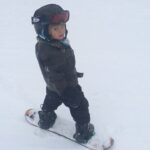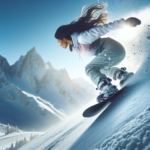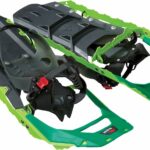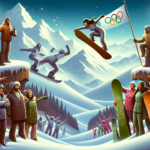In this article, “How Old Is Too Old To Snowboard?”, you’re about to embark on an adventure that will change the way you think about age and snowboarding. It’s not about the years in your life, but the life in your years that truly counts, especially when it comes to shredding the snow-covered slopes. You’ll explore professional opinions, science-backed evidence, and exhilarating first-hand accounts that break down any preconceived barriers you might hold about age and this thrilling winter sport. So, tighten your bindings and prepare to shift your perspective: the mountain is waiting for you, regardless of how old you are.
Understanding Snowboarding
An Overview of Snowboarding
Imagine yourself swirling down a mountain slope, wind brushing against your face as you weave your way through stunning white blankets of snow. That is the enticing world of snowboarding. This extreme winter sport, popularized in the 1960s, involves riding a board attached to a rider’s feet downhill or on flat surfaces. It’s an exhilarating sport that can be enjoyed recreationally or competitively.
Physical Demand in Snowboarding
Snowboarding is an exciting and physically demanding sport. It requires good balance, control, flexibility, and overall physical strength, with the legs, core, and arms actively involved while descending slopes. The sport harnesses your whole body, engaging various muscles that must respond quickly to swiftly changing physical demands as you shift your weight to steer your board.
Required Skills for Successful Snowboarding
To become a good snowboarder, you need to develop a set of skills. Balance is critical because you have to stay upright on your board while moving at high speeds down a slope. Flexibility is necessary too. The sport requires bending, twisting and adjusting your body in different ways. Besides, you need excellent coordination and spatial awareness to navigate through different terrain and react adequately to the changing landscape.
Age Considerations in Snowboarding
Starting Age for Snowboarding
The ideal starting age for snowboarding varies, but generally, kids can start learning as soon as they express an interest and can handle the physical demands. Typically, children begin snowboarding lessons around the age of 5 or 6. Snowboarding requires a certain level of maturation, physical development, and coordination, so it’s crucial to ensure your child is ready.
Why Age Matters in Snowboarding
Age matters for several reasons when it comes to snowboarding. Younger people are generally more adaptable and learn new skills quicker. They usually also have more time to practice and less fear of personal injury. However, older people have the advantage of patience and determination, often critical in learning the techniques required in snowboarding.
Does Snowboarding Have an Age Limit?
The short answer is, no, snowboarding does not have an age limit. You might be surprised to know that a significant number of snowboarding enthusiasts are over the age of 50. As long as you’re physically capable and willing to learn, age simply becomes a number when snowboarding.
Physical Health Impact on Snowboarding Ability
The Necessary Physical Fitness for Snowboarding
Even though anyone can enjoy snowboarding, it’s important to remember that it’s a physically demanding sport. It requires cardiovascular fitness, muscular strength, and good balance. Regular physical exercise and strength training are essential in preparing your body for the demands of snowboarding.
Snowboarding and Impact on Joints
Snowboarding can put stress on the joints, especially the knees and ankles. This is because the sport requires constant leg movement and balance to control the snowboard. Wearing professional protective gear and performing specialized exercises can help minimize the potential impact on the joints.
How Age Affect Physical Capabilities for Snowboarding
As people age, strength and flexibility may decrease and the risk of injury can increase. This is not to discourage older people from snowboarding. Instead, it underscores the importance of proper physical conditioning and training. Regular exercise can boost strength and stamina, rendering snowboarding enjoyable and less strenuous.
Mental Readiness For Snowboarding
Influence of Age on Emotional Readiness
Age can undoubtedly affect mental readiness for snowboarding. Younger individuals often have less fear and more willingness to take risks. Conversely, older individuals might be more cautious. But this doesn’t mean they can’t enjoy snowboarding. In fact, it can be beneficial, since their caution can lead to making safer decisions while riding the slopes.
Managing Fear and Anxiety in Older Age Snowboarding
As an older snowboarder, it’s natural to feel some apprehension. It’s crucial to remember that it’s okay to start slow, learn at your own pace, and not to compare yourself to others. Keeping your anxiety in check can lead to a more enjoyable experience and better snowboarding skills.
The Role of Mental Fitness in Snowboarding
Snowboarding is not only a physical activity but also a mental game. A focused and calm mind can significantly enhance your performance. Mental fitness is just as important for executing precise movements, keeping balance, and adjusting to changing conditions swiftly.
Learning Snowboarding Later in Life
Starting to Snowboard in Middle Age
Starting snowboarding in middle age is not uncommon. It’s a great way to stay active, enjoy nature and learn a new skill. As long as you’re in reasonable physical shape, willing to learn, and equipped with a positive attitude, learning to snowboard at any age can be an enjoyable experience.
Snowboarding Training for Seniors
Seniors should take a tailored approach to snowboarding. A professional instructor with experience in teaching older adults can really make the difference. They can suggest modifications, ensure you’re learning at a comfortable pace, and prioritize safety. Regular physical fitness routines encapsulating strength, balance, and flexibility exercises will also be incredibly helpful.
Challenges and Benefits for Senior Snowboarders
Snowboarding can pose challenges for seniors, including the potential for injury or strain. On the other hand, snowboarding also offers numerous benefits. It is a wonderful form of physical exercise, provides opportunities for socialization, and contributes to overall mental well-being. Not to mention, gliding down those slopes can be incredibly fun!
Factors Affecting Snowboarding Performance
Living an Active Lifestyle
Keeping an active lifestyle goes a long way in improving snowboarding performance. Regular exercise can help increase endurance, strength, flexibility, and agility needed to navigate the snowy slopes. Consequently, activities like swimming, strength training, and yoga are excellent complements to snowboarding.
Weather Conditioning and Tolerance
Your ability to well-tolerate and adapt to varied weather conditions can also affect your snowboarding performance. Cold temperatures, strong wind, snowfall – snowboarding weather can be fickle. Dressing appropriately in layers and being comfortable in different weather conditions will undeniably enhance your boarding experience.
Importance of Regular Practice for All Ages
Whether you’re young or just young at heart, regular practice vastly improves snowboarding performance. Spending time on the slopes helps strengthen your snowboarding skills, increases your familiarity with your equipment, and hones your adaptability to various terrains and snow conditions.
Professional Snowboarders Over 50
Successful Elderly Snowboarders
When it comes to elderly snowboarders, several professionals have impressed the world with their skills despite their age. Riders like Banana George Blair, who spent a lifetime waterskiing and snowboarding, prove that age is not a barrier to enjoy or even excel in snowboarding.
Learning from Experienced Elderly Snowboarders
There is much we can learn from aged and experienced snowboarders. They embody that learning and enjoying sports has no age limit and demonstrate how one can adapt their approach yet continue to participate enthusiastically.
Inspiration for Senior Snowboarding Enthusiasts
Elderly professional snowboarders are an inspiration to seniors looking to pursue this sport. Their stories prove that with regular physical fitness, a positive attitude, and a love for the sport, you can step onto a snowboard and zip down a slope no matter how old you are!
Improving Snowboarding Skills in Older Age
Adapting Snowboarding Techniques with Age
As you age, it’s important to adapt your snowboarding techniques to match your physical abilities. This might mean making smoother turns, reducing your speed, or focusing more on control versus tricks. Remember, the vital thing is to enjoy snowboarding and reduce the risk of injury.
Choosing the Right Equipment
Choosing the right equipment can significantly impact your performance and safety while snowboarding. As you age, you might prefer a snowboard that is easier to control and comfortable boots that offer good support. Using professional-grade and well-fitted safety gear is also crucial.
Staying Fit and Healthy for Snowboarding
Continued physical fitness is key to improving your snowboarding skills. Regular cardiovascular exercises, strength training, and balance improving movements can help maintain physical fitness. Besides, a healthy diet can provide the energy needed for the sport.
Health and Safety Tips for Older Snowboarders
Understanding the Risks of Snowboarding
Like any sport, snowboarding comes with its own set of risks like falls, collisions, or the cold weather. Understanding these risks and taking steps to mitigate them, such as taking lessons, wearing safety gear, and being mindful of the weather conditions can add safety layers to your snowboarding experience.
Health Checks before Snowboarding
Regular health checks are particularly important for older snowboarders. A routine physical examination can ensure your body is capable of handling the physical stress that comes with snowboarding. It’s always better to check with your doctor before you strap on your snowboard.
Importance of Safety Gear for Older Snowboarders
Investing in quality safety gear, including a helmet, wrist guards, and padded clothing, is essential for any snowboarder, but particularly crucial for seniors. Ensure that your gear is current and, most essentially, fits well. Properly fitting gear can go a long way in reducing the risk of potential injuries.
Continuing to Snowboard in Elderly Years
Snowboarding Beyond the Age of 60
Contrary to what some people might think, you can definitely enjoy snowboarding beyond the age of 60. It requires a few considerations and some adaptations, but continuing to snowboard can be a fantastic way to stay active and continue to enjoy something you love.
Benefits of Snowboarding in the Elderly Years
The benefits of snowboarding in the elderly years are numerous. It’s an excellent form of physical activity, it promotes better balance and coordination, and it offers a golden opportunity to connect with nature and fellow boarders. More importantly, it adds an element of adventure and fun to life!
Modifying Snowboarding Techniques with Advancing Age
As you age, modifying your snowboarding techniques becomes more relevant. Slowing down, embracing smooth and controlled movements, and giving yourself permission to take breaks can make snowboarding more enjoyable. It’s not about how hard or fast you can go; it’s about relishing the thrill of the ride.
There you have it! You now know that no one is too old to snowboard. As long as you’re physically able and mentally ready, it’s a sport you can enjoy at any age. So why not strap on a board and feel the exhilaration of gliding down the slopes? Remember, age is just a number!
- What Snowboard Bindings Should I Get? - January 23, 2024
- What Size Screws For Snowboard Bindings? - January 23, 2024
- How To Snowmobile On Water? - January 23, 2024
